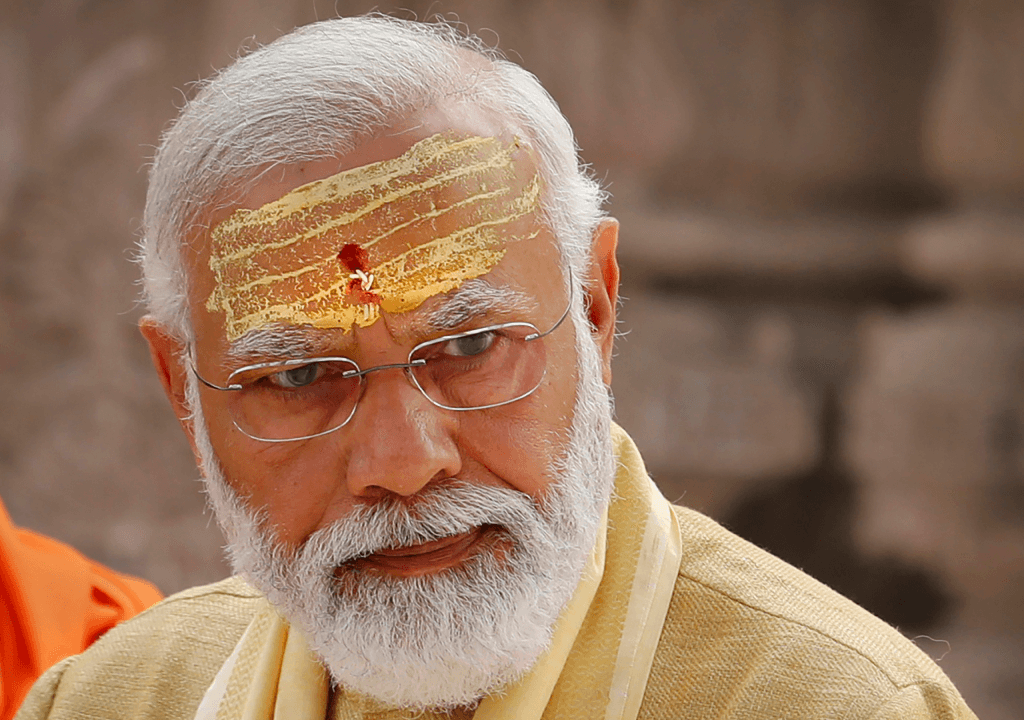India’s general election is completed, and Narendra Modi and his Bharatiya Janata Party(BJP) have formed a government. However, the result is still causing wonder among political analysts in India. Everyone predicted a third Modi government, but no one expected BJP to fall below the majority. When we analyze the election results in India, we can understand that there was no significant anti-incumbency and the opposition was not strong enough to challenge Modi. Yet, Modi did not achieve a single-handed majority like his previous two terms. Indian media have been searching for reasons from the day of vote counting, and one interesting factor they found is that the RSS (Rashtriya Swayamsevak Sangh), the parent Hindu nationalist organization of BJP, did not cooperate with BJP as they did in previous terms. This is evident from the dipping vote percentages, the loss of votes in strongholds, and the failure of BJP candidates who were selected over RSS nominees.
Narendra Modi entered the public space as an ordinary worker of the RSS, and the RSS supported him in attaining all the positions he got in his political career. He still works with the RSS’s agendas, no doubt about it. However, a strong, disciplined organization will never like individuals who grow larger than the organization itself. Over the last two terms, Modi has grown larger than the RSS, and of course, larger than the BJP. The last government was criticized for not being an NDA (Alliance led by BJP) government or a BJP government, but a Modi government. All decisions were taken single-handedly by Modi and his team. Modi was raised as an idol, and all the campaigns for the last general election were in the name of Modi, like “Modi ki Guarantee”, Some people started chanting his name with slogans for Hindu gods, like “Har Har Modi” instead of “Har Har Mahadev”, which definitely hurts a Hindu organization. This idolization became more evident when Modi took the priest role in the inauguration of the Ayodhya temple, the biggest election topic raised by the BJP. Modi himself even announced during the campaign that he is a representative of God. Further worsening the situation, during the campaign, the BJP chief and Modi supporter, JP Nadda, publicly stated that the BJP had grown to a level where they did not need assistance from the RSS. This was definitely a statement that could hurt RSS associates, who were already angry that Modi did not do enough with the RSS’s agendas, despite having a superior majority in Parliament. This resulted in dipping vote percentages and losses in the BJP’s secure seats.
Many believe the tiff between BJP and RSS is a result of ego clashes among leaders of both organizations. Despite RSS maintaining calm during the election period and avoiding statements, after the results, they criticized the bitter campaigning by both the ruling party and the opposition in the recent general election. In a rare public comment on politics, though it included criticism of the opposition, it was clear the target was BJP. Mohan Bhagwat, the chief of the Rashtriya Swayamsevak Sangh (RSS), also demanded urgent attention to be given to the strife-torn remote state of Manipur, a security failure during Modi’s rule that has often been reported as neglect by Modi. In his first comments after the election results last week, Bhagwat said the election should be viewed as a competition and not a war, and criticized parties for comments that stoked religious divisions. He stated on Monday in Nagpur that the kind of statements made in campaigns, the manner in which both sides criticized each other, and the lack of concern for social divisions resulting from their actions raised serious concerns about the country’s operation. “The opposition is not an opponent”, he said, in what appeared to be a dig at the BJP, which sharply criticized the opposition and even called “Congress Mukt Bharat ”, which means the washing out of the main opposition party from Indian Politics.
Analysts believe that within BJP, a group has developed under the leadership of Modi and Shah, which is cornering the RSS leadership. Interestingly, RSS has not maintained the same level of firmness against the Indian National Congress in previous times. Therefore, if the relationship between RSS and BJP worsens, it will have a seismic impact on Indian politics, although the likelihood of this happening is low. Both parties know they need each other. Even though Modi garners neutral votes, there are not many other leaders in BJP who can cultivate the same popularity among the common people. Considering this is Modi’s last term according to BJP’s age limit program, BJP cannot sustain its machinery and leadership without RSS. Possibly, the successor of Modi will be decided by RSS. For RSS, if BJP is not in power, they will face challenges similar to those during the Indian National Congress’s time. Therefore, both RSS and BJP need each other, and despite any discontent between leaders, it is believed, they will ultimately cooperate with each other.








